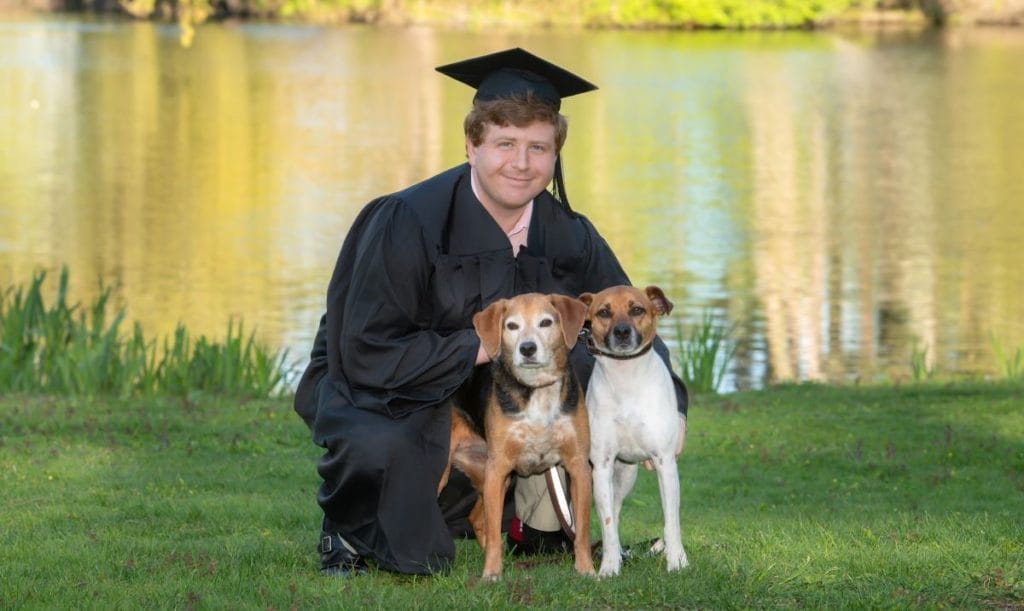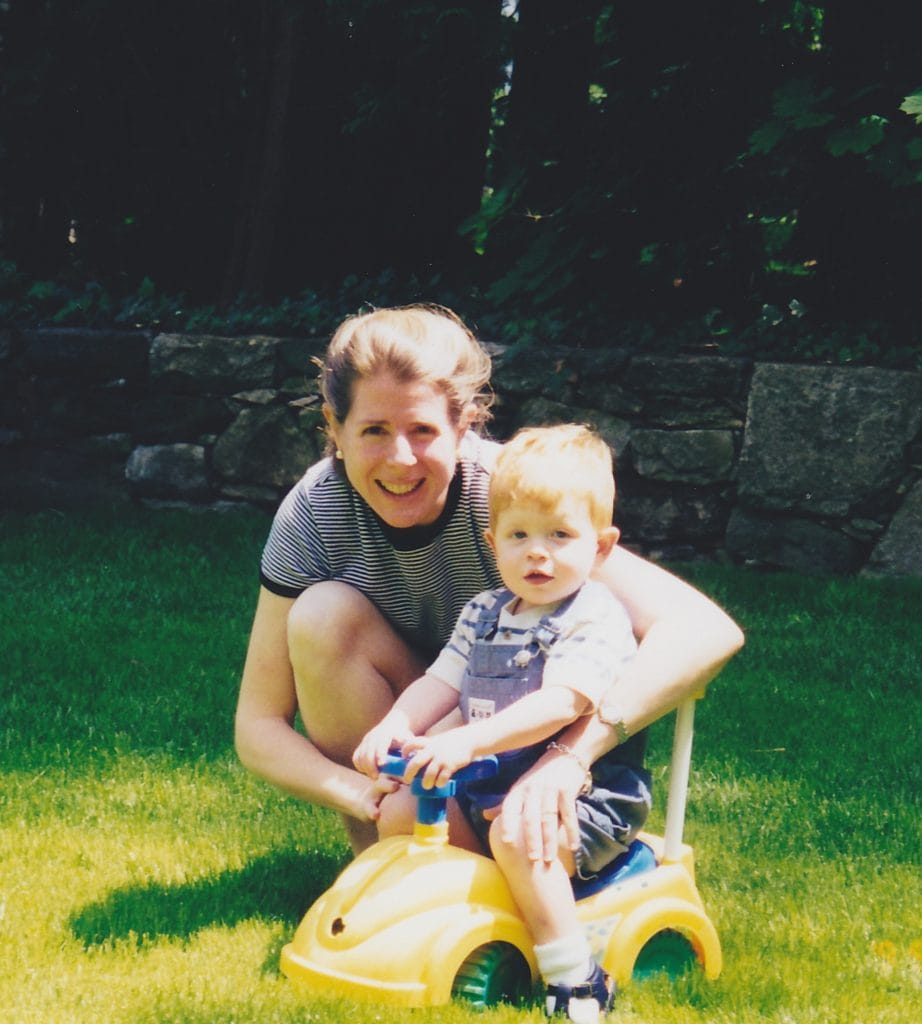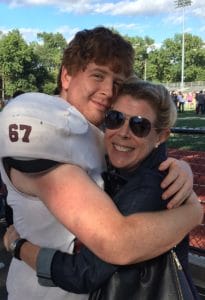
Our oldest was born in 1997. It had taken 10 years to become parents, and we were elated when we had Ryan.
However, breastfeeding my baby boy didn’t work out as planned, and some formula caused him to vomit. Since it was the food allergy “dark ages” of the late nineties, I never questioned why – I just looked harder to find a formula he could tolerate.
Food allergy parents will recognize, this was the beginning of our food allergy journey. But I missed the early smoke signals. At about 15 months, it seemed like Ryan had a lot of sudden-onset “tummy bugs”. After instant replays of symptoms with Haagen-Dazs ice cream twice in one week, I knew something was off. The food label showed just four ingredients: cream, milk, sugar and egg yolks. He’d tolerated dairy since he was 12 months old. Could egg be the problem?
Allergy testing confirmed an egg allergy, along with suspected allergies to peanuts, soy, and tree nuts. I walked out of our appointment shell-shocked, an epinephrine prescription in hand, knowing that our life had just taken a left turn.
Over the years, Ryan’s list of allergies grew to 12 foods, but fortunately, he would also outgrow several of them. By 2016, Ryan was still severely allergic to eggs and peanuts, plus chickpeas, lentils and peas.
In February 2016, Ryan, now in his late teens, received his college acceptance. He was elated, and my husband and I, and Ryan’s two siblings celebrated the good news. But when my initial excitement subsided, my allergy mom worries bubbled up and over.
College Wake-up Call
For 17 years, we’d been trailblazing without a trail map. To keep my eldest safe, I had become chief pathfinder and uber-allergy mom. I was afraid that my protective zeal – even though it came from a place of deep love – had inadvertently stifled Ryan’s own development of some critical skills. He would need those to navigate living with food allergies on his own.


I feared that he wasn’t as well prepared as he should have been to fend for himself at college with food allergies.
- How would food allergies be addressed in the college’s large, common dining room?
- Did he have the advocacy skills to navigate food prepared by others, every day, every meal?
- Would he remember to carry his epinephrine everywhere? All the time?
- Would he know what to do and when to do it if he had an allergic reaction?
- Were his food label reading skills up to snuff?
I mentally checked off the skills he had down cold. He was great about carrying his epinephrine; he was crystal clear on cross-contact; he was a careful and confident label reader. All good! But there were gaps.
While Ryan knew the symptoms of his allergic reactions, his ability to use his auto-injector on himself was untested. Even after all these years, we – and he – had yet to use his auto-injector. Nor was he as confident as he should have been advocating for himself. At restaurants and in various social situations, I noticed that he’d become way too comfortable letting me and his dad take the lead. (And of course, we would dive in, without hesitation.)
Crafting the Elevator Pitch
With six months of runway between Ryan’s college acceptance and move-in day, we had work to do.
To prepare him, we talked a lot about food-allergic reactions. How they could look and feel, and how they could differ from past reactions. We reviewed his emergency action plan and what he needed to do if he had a reaction. The need to use the epi first and fast. (Not Benadryl first anymore.) He practiced using the auto-injector trainers.
We also encouraged him to take the lead on the allergy explanation at restaurants, at different social gatherings, and with the college’s dining services team. Instead of diving in and doing it for him, my husband and I held back – giving him time to find his voice. As weeks passed, Ryan grew more comfortable with his own version of the food allergy elevator pitch.
While it was great to see him gain confidence in taking the lead, I’ve spent a lot of time re-thinking Ryan’s college launch process, and what I’d do earlier and change – if there were do-overs.
Finding Your Village and Letting Go
As you prepare your children with food allergies for college and young-adulting over the years (not months), I hope the 20/20 hindsight that I gained can help.
Here are the three things I would definitely do differently today:
1. Leave My Own Bubble – I would reach out sooner rather than later to the big, loving and giving food allergy community, to learn best practices and find moral support. I would join Facebook groups for families with food allergies and participate actively. If I didn’t like the vibe of a group, I’d be quick to find others that were a better fit.
2. Nurture Food Allergy Friendships – A food allergy peer group can be powerful for a kid. At school, it’s not always easy to find your food allergy peeps. The non-profit FAACT runs an allergy friendly day camp – called Camp TAG – which is in-person when we’re not in a global pandemic. Both FAACT and FARE host weekend events for tweens and teens where they connect in person. Knowing other kids with food allergies can be hugely reassuring and empowering. I didn’t realize this until I attended a FARE teen summit in 2018, and by then my son was a junior in college and 100 percent uninterested.
3. Coach From the Sidelines – While part of the food allergy handoff is achieved through modeling caution and management skills to your child, lessons are baked-in when you actively involve your child. So increasingly over time, let them run the plays while you coach and encourage from the sidelines.
Space and Grace to Grow
In May 2020, Ryan graduated from Bates College in Maine, and now works for a regional bank in financial analysis.
As his mom, I’ve learned the difficult lesson – albeit a bit late – that as a food allergy parent you always want to be in hand-off mode with your child with allergies. You need to keep one eye on the here and now, and one eye on the future. I now know that the skills and knowledge kids need to fully ‘own’ their food allergies are definitely not acquired by osmosis, nor are they acquired overnight.
You need to give your child the time, space and grace to practice, then practice some more. It’s a bit like teaching them to ride the tricycle, then the two-wheeler with trainers, then the two-wheeler without trainers. First you hold on tight, then you let go, then you hold your breath through the wobbles (and pray). Hopefully, there are only a few scrapes, and no visits to the ER.
Allergy mom Gayle Rigione is the CEO and co-founder of Allergy Force, the app designed to help manage food allergies with everything from alerts to emergency assistance, grocery scanning, restaurant cards, recipes and more. Visit AllergyForce.com.
Related Reading:
A Parent’s Advice for Handing the Food Allergy Reins to a College Student
Colleges That Go the Distance for Students with Food Allergies
From Dorms to Dining Halls, the Good and the Bad of the College Experience with Food Allergies





